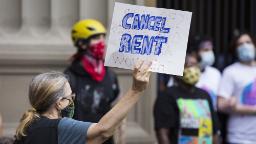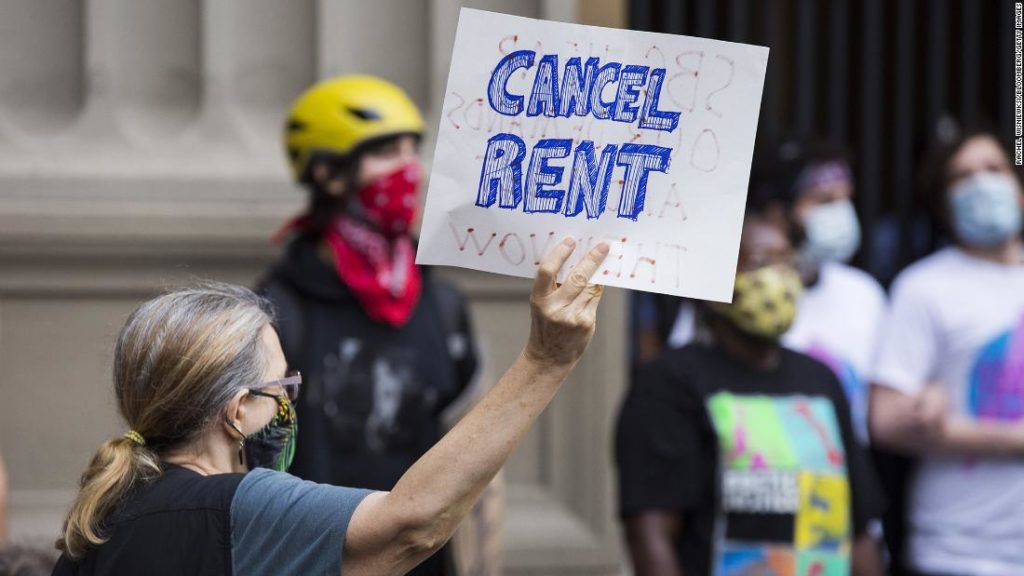
But then the coronavirus upended it all.
The outbreak in March resulted in the sudden evaporation of her job as an administrator for an executive travel company. By August, when the $600 a week supplemental unemployment insurance stopped, she was having trouble affording her $1,250 a month rent. By October, she found herself sobbing in a courtroom in Omaha, Nebraska, trying to hold on to her rental home and keep her family from becoming homeless because she owed $3,750 in back rent.
“I’ve been paying every dollar I’ve been able to each month,” Phelps said. “Stimulus money and some set aside for an emergency — we nickel-and-dimed-it — got us through the first six months. We are eating ramen and I’m paying whatever I can to my rent.”
But at the eleventh hour, it was an unlikely government institution that came to her aid: the Centers for Disease Control and Prevention. Her legal aid adviser told her about an eviction protection the federal agency had put in place that she qualified for. Once she was before a judge during her eviction hearing, Phelps presented the CDC order that allowed her to stay in her home.
The emergency CDC order, which went into effect on September 4th nationwide, temporarily prohibits new and previously filed evictions from occurring in an effort to prevent further transmission of the coronavirus.
“I am the kind of American that needs it now, who never needed help before,” said Phelps. “I have always paid my bills on time. Never faced eviction. I didn’t know these services existed. I’m so grateful that it is even there.”
But the order is set to expire at the end of the year and faces legal challenges, meaning Phelps, as well as potentially millions of other renter households across the country, may still lose their homes.
Since the order does not cancel or freeze rent, all of the tenant’s back rent will be due come January 1. Without rent relief or an extension of the protection, many struggling renters will — again — face eviction.
“The pandemic is not going away before the end of the year,” said Michael Trujillo, staff attorney with the housing program at the Law Foundation of Silicon Valley, in San Jose.
If the CDC moratorium is allowed to expire without a replacement protection, a tsunami of evictions is possible, he said.
“We’re not out of the woods in terms of a huge wave of evictions in our country with the kind of rent debt that people owe.”
Many tenants don’t know there’s help
The CDC order aims to protect those who can’t afford their rent (tenants can still be evicted for things like engaging in criminal activity on property, threatening the health or safety of other residents or damaging property). Legal aid groups say they have seen the docket in eviction courts drop significantly after the CDC order went into place, but not in all jurisdictions. Evictions have not stopped.
The biggest problem is that not enough people know about the order, said Caitlin Cedfeldt, an attorney with the Housing Justice Project at Legal Aid of Nebraska. “It works if we’re involved and the court is involved or if the tenant has the wherewithal to invoke the order in the first place.”
“We’ve heard from tenants that landlords will tell people that CDC doesn’t apply to them,” Cedfeldt said. There is no restriction on the moratorium by type of housing or geography, only that tenants meet the requirements of the declaration.
She said she has also heard of scare tactics on the part of landlords. “Tenants are being told they need to leave,” Cedfeldt said. “Landlords will say ‘You know this declaration is under perjury and you could go to prison.’ But people might say, ‘Should I just leave rather than have a felony?'”
But for tenants who are facing eviction, it is still helpful now to prepare the order, said Cedfeldt.
“If you qualify, sign it, give it to your landlord and keep a copy,” she said. “There are still penalties for landlords who disregard this.”
Individual landlords are subject to a fine of as much as $250,000, plus a year in jail. Organizations are subject to a penalty of as much as half a million dollars per eviction.
An uncertain future
For Phelps, the CDC’s reprieve is welcome. But it does not end her worry.
“I’m still scared,” Phelps said. “I’m hoping for an extension of the program and a rent supplement. As long as the country is in the turmoil we’re in, we are going to need the support.”
Meanwhile, after dozens of applications, Phelps found a job with an insurance company handling Medicare enrollment. But she doesn’t start until December and she’s still trying to secure rent relief funds to cover her back rent and catch up on overdue utility bills. If nothing comes through, she hopes she can pay back a little extra each month once she starts getting a paycheck.
“2020 has thrown so much at us,” she said. “It has been a complete overhaul in how we are living, working and what we thought our retirement was going to be like.”
She won’t be buying a house this year. But she still got married in August.
“We just got married in the park,” she said. “It was just us. And, at the end of the day, we are married.”
It is harder for her to see her kids go through this.
“The kids’ birthdays just got passed over and now Christmas is coming,” she said. “As we move into the holiday season, this just has to be one of those years, when we’re just thankful we have each other and we’re healthy. We’re going to be family focused and not about the newest, greatest anything. We have a roof over our heads and we have each other.”
You may also like
-
Afghanistan: Civilian casualties hit record high amid US withdrawal, UN says
-
How Taiwan is trying to defend against a cyber ‘World War III’
-
Pandemic travel news this week: Quarantine escapes and airplane disguises
-
Why would anyone trust Brexit Britain again?
-
Black fungus: A second crisis is killing survivors of India’s worst Covid wave

